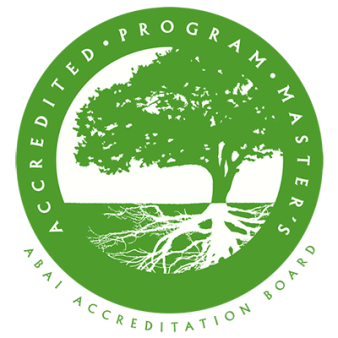Gain the expertise and skills necessary to make a positive impact on the lives of those with diverse behavioral needs.

ABA Program Accreditation Statement
Master of Science in Applied Behavior Analysis (ABA) degree program accreditation awarded by the Association for Behavior Analysis International Accreditation Board.
Successfully working with individuals with unique behavioral needs - such as those who fall on the autism spectrum or those with developmental disabilities - requires a unique set of skills, knowledge and expertise.
The Regis College Master of Science in Applied Behavior Analysis (ABA) program uses active responding role-play, peer presentations, and comprehensive practicums to deepen the learning experience in the field of applied behavior analysis and help you better address the unique needs of children and adults with behavioral issues.
Recognized across the country, Regis College's ABA program provides a dynamic and interactive learning environment, exceptional faculty, and guaranteed field experience - all leading to personal and professional satisfaction and success.
To help reduce barriers to earning your degree, we offer this program both on-campus and online, making it accessible to students with limited scheduling availability. Most students are able to complete the course of study in just two years.
An ideal blend of course formats will optimize your learning. Your focus will be on one course at a time in our intensive eight-week hybridized format. Small interactive classes set our program apart from other universities and provide you with a lifelong professional network.
We invite you to download the MS-ABA flyer to learn more and to hear what a student has to say! Or join us for an upcoming virtual information session. You'll hear from Program Director Dr. Jacquelyn MacDonald and our admission team.
Federal Loan Updates: What They Mean for You and How We Can Help
University Statement
Regis College’s School of Health Sciences is proud to offer our programs in Applied Behavior Analysis (ABA), including the Master of Science in ABA and Certificate in ABA, our comprehensive, high-quality educational ABA programs housed within the Department of Applied Behavior Analysis. Through a combination of coursework and supervised fieldwork experience, the ABA programs equip students with the knowledge and experience needed to become competent, professional clinicians who are proficient in the research and practice of ABA. The rigorous curriculum prepares students for certification as a Board Certified Behavior Analyst (BCBA)® through the Behavior Analyst Certification Board (BACB)®, and combines students’ personal and professional goals, personalized mentorship, and advanced professional training.
Mission of the Applied Behavior Analysis (ABA) Program
In alignment with the mission of Regis College, we strive to uphold an inclusive and diverse Regis ABA community where every student and alumnus feels supported and connected. The ABA programs provide students with an historical and current scientific framework for interpreting and applying the science as future professionals in the field of behavior analysis, with the goal of delivering expert, socially significant service.
Program Objectives
- Explain the causes of behavior from assessment of behavior to intervention in both scientific and layman’s terms.
- Create effective measurement procedures for culturally sensitive behavioral targets.
- Conduct a variety of indirect assessments, skills assessments, and functional behavioral assessments and interpret the results.
- Design effective, empirically validated programs based on assessment results.
- Interpret visual displays of data across a variety of single-subject designs.
- Train caregivers, including staff and parents, to implement culturally sensitive empirically validated interventions.
- Supervise behavior analytic interventions.
- Demonstrate ethical and culturally competent treatment of all individuals.
- Provide comprehensive care using multidisciplinary collaboration.
-
What careers will a master's in applied behavior analysis prepare me for?
Earning a master's degree in ABA broadly helps prepare students for a range of careers where they may be expected to interact with individuals who exhibit unique behavioral needs. Some of the common careers that this degree prepares students for include those below:
Clinical Director
Average Salary: $83,527
The BCBA Clinical Director is responsible for managing all aspects of clinical operations relating to the treatment of clients. A clinical director may also oversee administrative operations, develop policies and procedures, and provide supervision for clinical supervisors.University/College Professor
Average Salary: $74,954
A BCBA University/College Professor typically teaches courses on various topics related to Applied Behavior Analysis. A University/College Professor may also provide clinical services, hold an administrative position, or conduct research within the field of ABA.Clinical Supervisor
Average Salary: $73,835
The BCBA Clinical Supervisor oversees the training and supervision of BCBA’s and/or trainees delivering services to clients. A Clinical Supervisor may conduct assessments, review treatment plans and goals, and provide ongoing feedback of treatment program implementation.ABA Training Coordinator
Average Salary: $72,221
An ABA Training Coordinator often consults and teaches about the principles of Applied Behavior Analysis. They may provide training opportunities within a specific organization, school, or clinic, or for community educational purposes.
Published Research
-
Publications
- Guinness, K. E., Atkinson, R. S., Parry-Cruwys, D., and MacDonald, J. M. (2024). Effects of feedback timing on accuracy of functional analysis implementation. Journal of Organizational Behavior Management, 44, 1, 3-14. DOI: 10.1080/01608061.2023.2168327
- Guinness, K. E., Parry-Cruwys, D., Atkinson, R. S., and MacDonald, J. M. (2023). An online sequential training package to teach APA citation formatting: Within and across participant analyses. Behavioral Interventions. Online first publication. https://doi.org/10.1002/bin.1988
- Davis, M., Slaton, J., MacDonald, J., and Parry-Cruwys, D. (2023). Comparing simultaneous and sequential food presentation to increase consumption of novel target Foods. Behavior Analysis Practice, 16, 1124–1137. https://doi.org/10.1007/s40617-023-00789-x
- Atkinson, R., Simonds, K., Parry-Cruwys, D., Wilson, J., and MacDonald, J. (2023). An evaluation of environmental arrangement on recycling and contamination rate on a college campus. Behavior Analysis: Research and Practice, 23(1), 24–35. https://doi.org/10.1037/bar0000250
- Atkinson, R., Parry-Cruwys, D., and MacDonald, J. (2022). Teaching graduate students to enter fieldwork data using asynchronous online instruction. Behavior Analysis in Practice, 16(2), 511–529. https://doi.org/10.1007/s40617-022-00732-6
- Parry-Cruwys, D. E., Guinness, K. E., Atkinson, R. S., Domozick, K., Escobar, A., and MacDonald, J. M. (2022). Using behavioral instruction to teach APA citation formatting, Behavioral Interventions, 37(4), 1166-1180. https://doi.org/10.1002/bin.1904
- Rose, J. C. C., MacManus, C., MacDonald, J., and Parry-Cruwys, D. (2022). Mitigating racial inequity by addressing racism in the criminal justice system: A behavior analytic approach. Behavior Analysis in Practice, 15, 635-641.
- Parry-Cruwys, D., Atkinson, R., and MacDonald, J. (2021). Teaching graduate students to identify and adhere to practicum requirements. Behavior Analysis in Practice, 15, 433-442.
- Berube, T., MacDonald, J., and Parry-Cruwys, D. (2021). Teaching abduction prevention skills to children using a one-on-one training setting. Behavioral Interventions, 36, 550-560. https://doi.org/10.1002/bin.1806
- Rudy Zaltzman, T., Parry-Cruwys, D., MacDonald, J., and Sweeney-Kerwin, E. (2021). An examination of observational learning using Skinner’s taxonomy of verbal behavior. Behavioral Interventions, 37, 153-169. https://doi.org/10.1002/bin.1819
-
Student Thesis Topics
- Effects of Constant versus Varied Rewards on Skill Acquisition with Children with Autism, Jessica Slaton, May 2023
- High needs learners and self-advocacy skills, Diana Parry-Cruwys, May 2023
- Effects of matrix training paired with video modeling on acquisition of empathic social responses in preschoolers with ASD, Diana Parry-Cruwys, May 2023
- The impact of caregiver training on responding to joint attention in children with autism spectrum disorder, Jacquelyn MacDonald, May 2023
- Implementing matrix training to increase communication of AAC users with ASD, Jessica Slaton, May 2023
- Learning pronoun preposition pairs using matrix training to children with autism, Jacquelyn MacDonald, May 2023
- Evaluating preference categories to identify possible reinforcers, Diana Parry-Cruwys, May 2023
- Assessing the value of self-advocacy skills training for individuals with autism, Diana Parry-Cruwys, May 2023
- Matrix training using speech generating devices, Jessica Slaton, May 2023
- Increasing cultural responsiveness in Applied Behavior Analysis: Behavioral skills training with fieldwork students, Jacquelyn MacDonald, May 2023
- The impact of caregiver training on responding to joint attention in children with autism spectrum disorder, Jacquelyn MacDonald, May 2023
- Increasing self-advocacy skills in higher needs learners, Diana Parry-Cruwys, May 2023
- Assessing the effects of video modeling on social initiation and parallel engagement, Diana Parry-Cruwys, May 2023
- Increasing cultural responsiveness in Applied Behavior Analysis: Behavioral skills training with fieldwork students, Jessica Slaton, May 2023
- Effects of video modeling on initiating and responding to greetings in children with autism, Jacquelyn MacDonald, May 2023
- Effects of video modeling on social initiation and engagement skills, Jaquelyn MacDonald, May 2023
- The effects of fidget use on response latency during circle time. Diana Parry-Cruwys, May 2023
- Teaching prevocational skills using an interrupted behavior chain, Jacquelyn MacDonald, May 2022
- The effects of varied instructional sequence on acquisition, mastery, and generalization of expressive and receptive skills, Jessica Slaton, May 2022
- The effects of varied instructional sequence on acquisition, mastery, and generalization of expressive and receptive skills, Jessica Slaton, May 2022
- Evaluation of whole categories as reinforcers, Jacquelyn MacDonald, May 2022
- Comparing the effectiveness of least-to-most prompting and video modeling on teaching a vocational response chain to adults with ASD, Diana Parry-Cruwys, May 2022
- Effects of behavior skills training to increase parent-led play skills with children with ASD, Jacquelyn MacDonald, May 2022
- The effects of using stimulus equivalence to teach peer preference on peer interaction and engagement for children with autism, Jessica Slaton, May 2022
- The effects of behavior skills training to increase behavioral technician-led play skills with children, Diana Parry-Cruwys, May 2022
- Using stimulus equivalence to teach children with ASD to choose activities based on the interest of a sibling, Jacquelyn MacDonald, May 2022
- Are fidgets distracting: An analysis of the use of fidgets during visual and auditory comprehension, Diana Parry-Cruwys, May 2022
- The effects of sign prompts on hand sanitizing behavior in cafeteria patrons at a private university, Jacquelyn MacDonald, May 2022
- Expanding communication of noun-verb pairings in children with autism spectrum disorder using matrix training, Jessica Slaton, May 2022
- Teaching pretend play skills using matrix training and video modeling, Jacquelyn MacDonald, May 2022
- The effects of using stimulus equivalence to teach peer preference on peer interaction and engagement for children with autism, Jessica Slaton, May 2022
- The effects of video modeled behavior skills training on play behaviors of siblings of children with autism, Diana Parry-Cruwys, May 2022
- Effects of Signage on Hand Sanitizing, Jacquelyn MacDonald, May 2022
Hands-On Learning Opportunities
In order to graduate from the program, all students must complete a required practicum, which offers the opportunity to apply your classroom learning in a professional setting. You will develop your skills, learn from professionals working in the field, and build your professional network.
Some of our partnership locations include:

Global Experience
As a Regis ABA graduate student, you will have the option to take part with fellow students and program alumni in a service trip to Iceland that occurs every other year. In Iceland, you will provide culturally competent behavior analytic care to children diagnosed with an autism spectrum disorder and/or a related disability. You will work together with fellow students, teachers, and alumni to teach young children socially significant behaviors and reduce unwanted problem behavior. The trip lasts between eight to 12 days.
Why choose Regis College?
- The skills you will learn over the course of this highly reputable program, provide an immediate gateway to job success.
- Experienced, well-informed, and industry active PhD-level BCBA® faculty keep your learning environment topical, timely, and true-to-life.
- Our ABA program provides an in-depth, thorough overview of the science of learning across diverse applications.
- Intensive practicum placements available at the on-site Regis College Autism Center or with one of our multiple partners are a fundamental part of your skills development.
- Apply classroom learning in a real-work setting, learn from qualified individuals working in the field, and build your professional network.
- Pursue your Master of Science in ABA, a certificate in ABA, a dual MEd/MS in ABA, or an MEd with an ABA certificate - all are pathways to becoming a board certified behavioral analyst.
- Become prepared for a variety of leadership roles in the implementation, evaluation, and administration of applied behavior analytic principles and methods.
How Will You Rise at Regis?
-
Podcast: Leading Voices of ABA at Regis
If you are interested in learning more about ABA, check out a podcast called ABA Inside Track, co-hosted by the program director, Jacquelyn MacDonald and practicum coordinator, Diana Parry-Cruwys. The podcast provides lively conversations between three board-certified behavior analysts on the hot topics in the industry and the research that fuels the field.
Expert Faculty
ABA Program Director Jackie MacDonald wins The New England Center for Children's Outstanding Educator of the Year Award!






